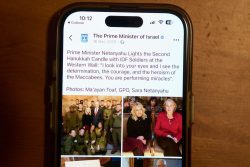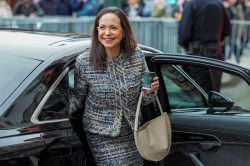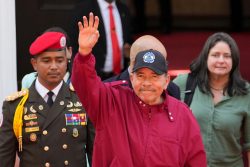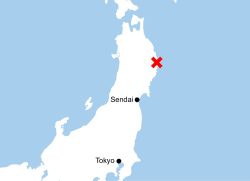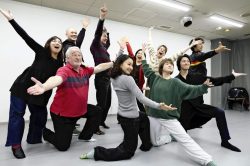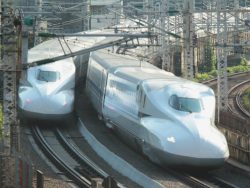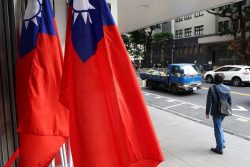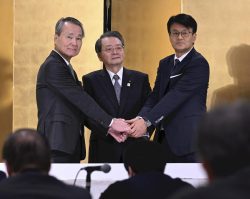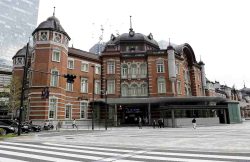Maduro Is Declared Winner in Venezuela’s Presidential Election as Opposition Claims Irregularities
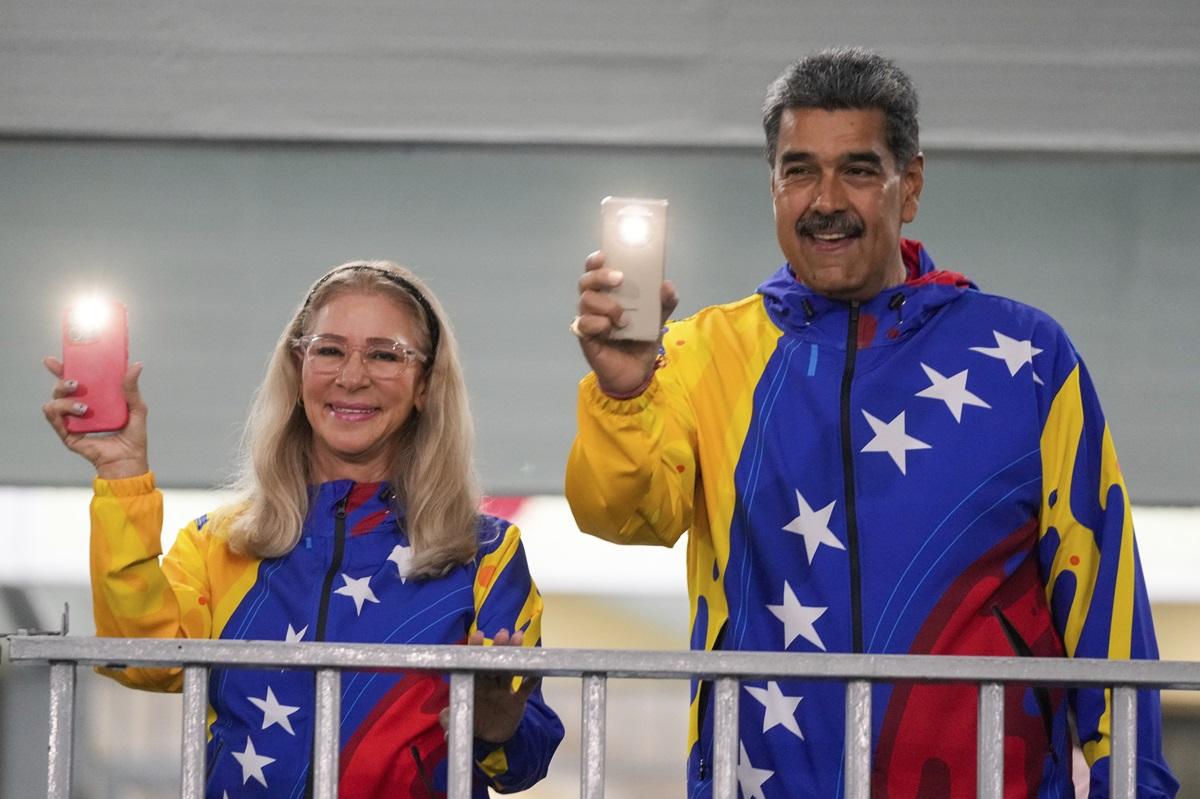
President Nicolas Maduro and First Lady Cilia Flores turn on their mobile phone flashlights after voting in the presidential elections in Caracas on Sunday.
13:24 JST, July 29, 2024
CARACAS, Venezuela (AP) — Nicolas Maduro was declared the winner in Venezuela’s presidential election Sunday, even as his opponents were preparing to dispute the results, setting up a high-stakes showdown that will determine whether the South American nation transitions away from one party rule.
Elvis Amoroso, head of the National Electoral Council, said Maduro secured 51% of the vote, overcoming opposition candidate Edmundo Gonzalez, who garnered 44%. He said the results were based on 80% of voting stations, marking an irreversible trend.
But the electoral authority, which is controlled by Maduro loyalists, has yet to release the official voting tallies from each of the 30,000 polling centers, hampering the opposition’s ability to verify the results.
The delay in announcing results — six hours after polls were supposed to close — indicated a deep debate inside the government about how to proceed after Maduro’s opponents came out early in the evening all but claiming victory.
Opposition representatives said tallies they collected from campaign representatives at 30% of voting centers showed Gonzalez trouncing Maduro.
THIS IS A BREAKING NEWS UPDATE. AP’s earlier story follows below.
Venezuelans waited anxiously for the results of Sunday’s presidential election that could pave the way to an end to 25 years of single party rule, even as some polls appeared to remain open six hours after a deadline to close.
President Nicolas Maduro, in seeking a third term, faced his toughest challenge yet from the unlikeliest of opponents: Edmundo Gonzalez, a retired diplomat who was unknown to voters before being tapped in April as a last-minute stand-in for opposition powerhouse Maria Corina Machado.
Opposition leaders were already celebrating, online and outside a few voting centers, what they assured was a landslide victory for Gonzalez. Their hope was boosted by purported exit polls showing a healthy margin of victory for Gonzalez. Exit polls are not allowed under Venezuelan law.
“I’m so happy,” said Merling Fernandez, a 31-year-old bank employee, as a representative for the opposition campaign walked out of one voting center in a working class neighborhood of Caracas to announce results showing Gonzalez more than doubled Maduro’s vote count. Dozens standing nearby erupted in an impromptu rendition of the national anthem.
“This is the path toward a new Venezuela,” added Fernandez, holding back tears. “We are all tired of this yoke.”
Maduro supporters were not showing any signs of throwing in the towel, however.
“We can’t give results, but we can show face,” a smiling Jorge Rodriguez, campaign chief for Maduro, said at a press conference.
Polls were supposed to begin closing at 6 p.m. but almost six hours after the deadline some voting centers in Caracas appeared to remain open. The opposition called for the National Electoral Council to begin counting ballots.
“This is the decisive moment,” Machado, flanked by Gonzalez, told reporters at their campaign headquarters.
Machado was careful not to claim victory before authorities announce results but said she had already received copies of some official voting tallies and they indicated a record turnout — exactly what the opposition needed to overcome Maduro’s well-greased electoral machine.
Gonzalez was similarly enthused, congratulating Venezuelans on the “historic” day and urging supporters to “celebrate in peace.”
Earlier, U.S. Vice President Kamala Harris offered her support. “The United States stands with the people of Venezuela who expressed their voice in today’s historic presidential election,” Harris wrote on X. “The will of the Venezuelan people must be respected.”
A few Maduro allies were also projecting confidence.
“The ballot boxes express what the streets said during these past few months of campaigning,” Maduro’s son, lawmaker Nicolas Maduro Guerra, said on X as night fell on the capital. “Victory for the Venezuelan people.”
But in the absence of any order to close polls, their optimism rang hollow.
Voters started lining up at some voting centers across the country before dawn Sunday, sharing water, coffee and snacks for several hours.
The election will have ripple effects throughout the Americas, with government opponents and supporters alike signaling their interest in joining the exodus of 7.7 million Venezuelans who have already left their homes for opportunities abroad should Maduro win another six year term.
Authorities set Sunday’s election to coincide with what would have been the 70th birthday of former President Hugo Chavez, the revered leftist firebrand who died of cancer in 2013, leaving his Bolivarian revolution in the hands of Maduro. But Maduro and his United Socialist Party of Venezuela are more unpopular than ever among many voters who blame his policies for crushing wages, spurring hunger, crippling the oil industry and separating families due to migration.
Maduro, 61, is facing off against an opposition that has managed to line up behind a single candidate after years of intraparty divisions and election boycotts that torpedoed their ambitions to topple the ruling party.
Machado was blocked by the Maduro-controlled supreme court from running for any office for 15 years. A former lawmaker, she swept the opposition’s October primary with over 90% of the vote. After she was blocked from joining the presidential race, she chose a college professor as her substitute on the ballot, but the National Electoral Council also barred her from registering. That’s when Gonzalez, a political newcomer, was chosen.
Sunday’s ballot also features eight other candidates challenging Maduro, but only Gonzalez threatens Maduro’s rule.
After voting, Maduro said he would recognize the election result and urged all other candidates to publicly declare that they would do the same.
“No one is going to create chaos in Venezuela,” Maduro said. “I recognize and will recognize the electoral referee, the official announcements and I will make sure they are recognized.”
Venezuela sits atop the world’s largest proven oil reserves, and once boasted Latin America’s most advanced economy. But it entered into a free fall after Maduro took the helm. Plummeting oil prices, widespread shortages and hyperinflation that soared past 130,000% led first to social unrest and then mass emigration.
Economic sanctions from the U.S. seeking to force Maduro from power after his 2018 reelection — which the U.S. and dozens of other countries condemned as illegitimate — only deepened the crisis.
Maduro’s pitch to voters this election is one of economic security, which he tried to sell with stories of entrepreneurship and references to a stable currency exchange and lower inflation rates. The International Monetary Fund forecasts the economy will grow 4% this year — one of the fastest in Latin America — after having shrunk 71% from 2012 to 2020.
But most Venezuelans have not seen any improvement in their quality of life. Many earn under $200 a month, which means families struggle to afford essential items. Some work second and third jobs. A basket of basic staples — sufficient to feed a family of four for a month — costs an estimated $385.
Judith Cantilla, 52, voted to change those conditions.
“For me, change in Venezuela (is) that there are jobs, that there’s security, there’s medicine in the hospitals, good pay for the teachers, for the doctors,” she said, casting her ballot in the working-class Petare neighborhood of Caracas.
Elsewhere, Liana Ibarra, a manicurist in greater Caracas, got in line at 3 a.m. Sunday with her water, coffee and cassava snack-laden backpack only to find at least 150 people ahead of her.
“There used to be a lot of indifference toward elections, but not anymore,” Ibarra said.
She said that if Gonzalez loses, she will ask her relatives living in the U.S. to sponsor her and her son’s application to legally emigrate there. “We can’t take it anymore,” she said.
The opposition has tried to seize on the huge inequalities arising from the crisis, during which Venezuelans abandoned their country’s currency, the bolivar, for the U.S. dollar.
Gonzalez and Machado focused much of their campaigning on Venezuela’s vast hinterland, where the economic activity seen in Caracas in recent years didn’t materialize. They promised a government that would create sufficient jobs to attract Venezuelans living abroad to return home and reunite with their families.
After voting at a church-adjacent poll site in an upper-class Caracas neighborhood, Gonzalez called on the country’s armed forces to respect “the decision of our people.”
“What we see today are lines of joy and hope,” Gonzalez, 74, told reporters. “We will change hatred for love. We will change poverty for progress. We will change corruption for honesty. We will change goodbyes for reunions.”
An April poll by Caracas-based Delphos said about a quarter of Venezuelans were thinking about emigrating if Maduro wins Sunday. The poll had a margin of error of plus or minus 2 percentage points.
Most Venezuelans who migrated over the past 11 years settled in Latin America and the Caribbean. In recent years, many began setting their sights on the U.S.
Both campaigns have distinguished themselves not only for the political movements they represent but also on how they have addressed voters’ hopes and fears.
Maduro’s campaign rallies featured lively electronic merengue dancing as well as speeches attacking his opponents. But after he caught heat from leftist allies such as Brazilian President Luiz Inacio Lula da Silva for a comment about a “bloodbath” should he lose, Maduro recoiled. His son told the Spanish newspaper El Pais that the ruling party would peacefully hand over the presidency if it loses — a rare admission of vulnerability out of step with Maduro campaign’s triumphalist tone.
In contrast, the rallies of Gonzalez and Machado prompted people to cry and chant “ Freedom! Freedom! ” as the duo passed by. People handed the devout Catholics rosaries, walked along highways and went through military checkpoints to reach their events. Others video-called their relatives who have migrated to let them catch a glimpse of the candidates.
“We do not want more Venezuelans leaving, and to those who have left I say that we will do everything possible to get them back here, and we will welcome them with open arms,” Gonzalez said Sunday.
"News Services" POPULAR ARTICLE
-
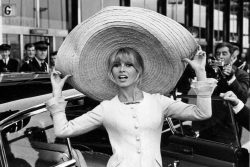
Brigitte Bardot, 1960s Sultry sex Symbol Turned Militant Animal Rights Activist Dies at 91
-
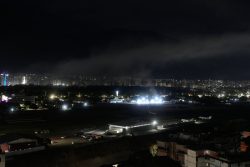
At Least 7 Explosions and Low-Flying Aircraft Are Heard in Venezuela’s Caracas
-
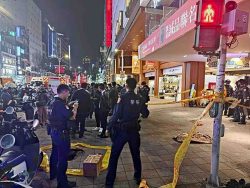
3 Killed in Taiwan Knife Attack, with the Suspect Later Falling to His Death from a Department Store (Update1)
-
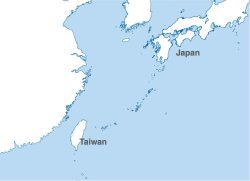
Southeastern Taiwan Shaken by Magnitude 6.1 Earthquake, No Immediate Reports of Damage
-

Japan’s Nikkei Stock Average Slumps as AI Stocks Tumble Ahead of US Jobs Data (UPDATE 1)
JN ACCESS RANKING
-

As Chinese Tourists Shun Japan, Hotels and Stores Suffer
-

Osaka-Kansai Expo’s Economic Impact Estimated at ¥3.6 Trillion, Takes Actual Visitor Numbers into Account
-

Japan Govt Adopts Measures to Curb Mega Solar Power Plant Projects Amid Environmental Concerns
-

BOJ Gov. Ueda: Highly Likely Mechanism for Rising Wages, Prices Will Be Maintained
-
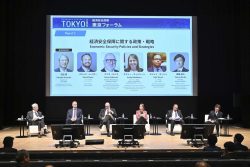
Economic Security Panels Debate Supply Chains, Rare Earths; Participants Emphasize Importance of Cooperation Among Allies


